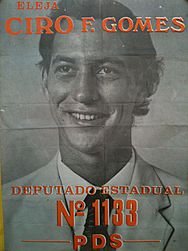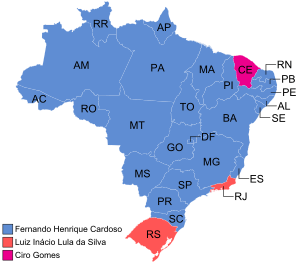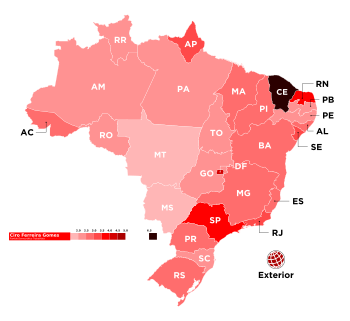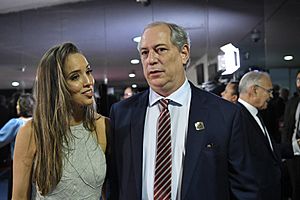Ciro Gomes facts for kids
Quick facts for kids
Ciro Gomes
GOMM
|
|
|---|---|
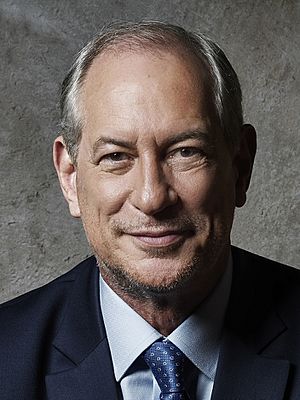
Ciro in 2021
|
|
| Member of the Chamber of Deputies | |
| In office 1 February 2007 – 1 February 2011 |
|
| Constituency | Ceará |
| Minister of National Integration | |
| In office 1 January 2003 – 31 March 2006 |
|
| President | Luiz Inácio Lula da Silva |
| Preceded by | Luciano Barbosa |
| Succeeded by | Pedro Brito |
| Minister of Finance | |
| In office 6 September 1994 – 31 December 1994 |
|
| President | Itamar Franco |
| Preceded by | Rubens Ricupero |
| Succeeded by | Pedro Malan |
| Governor of Ceará | |
| In office 15 March 1991 – 6 September 1994 |
|
| Vice Governor | Lúcio Alcântara |
| Preceded by | Tasso Jereissati |
| Succeeded by | Francisco Aguiar |
| Mayor of Fortaleza | |
| In office 1 January 1989 – 2 April 1990 |
|
| Vice Mayor | Juraci Magalhães |
| Preceded by | Maria Luíza Fontenele |
| Succeeded by | Juraci Magalhães |
| State Deputy of Ceará | |
| In office 1 February 1983 – 31 December 1988 |
|
| Constituency | At-large |
| Personal details | |
| Born | 6 November 1957 Pindamonhangaba, São Paulo, Brazil |
| Political party | PDT (since 2015) |
| Other political affiliations |
|
| Spouses |
Patrícia Saboya
(m. 1983; div. 1999)Patricia Pillar
(m. 1999; div. 2011)Giselle Bezerra
(m. 2017) |
| Children | 4 |
| Relatives | Cid Gomes (brother) |
| Alma mater | Federal University of Ceará (LL.B.) |
| Profession | Lawyer, university professor, writer |
Ciro Ferreira Gomes (born November 6, 1957), often known just as Ciro, is a Brazilian politician, lawyer, and professor. He is a leading member and vice-president of the Democratic Labour Party (PDT).
Ciro was born in São Paulo but grew up in the state of Ceará. He comes from a family with a long history in politics. He started his own political career in 1984. Over the years, he has held many important jobs. He was elected mayor of the city of Fortaleza and later became the governor of Ceará.
As governor, he was very popular. One of his programs, called Viva Criança, helped lower the number of babies who died in Ceará by 32%. This work earned him an international award from UNICEF. His success led him to become Brazil's Minister of Finance in 1994. In this role, he helped with the Plano Real, a plan that fixed Brazil's economy and stopped prices from rising out of control.
Ciro has run for President of Brazil four times: in 1998, 2002, 2018, and 2022. He has also served as a minister in the national government and as a member of Brazil's Chamber of Deputies, which is like the U.S. House of Representatives. He is known for his strong personality and for speaking his mind, which has earned him both praise and criticism.
Contents
Early Life and Education
Ciro Gomes was born in Pindamonhangaba, São Paulo, in 1957. His parents were José Euclides Ferreira Gomes Filho and Maria José Ferreira Gomes. When he was a young boy, his family moved to the city of Sobral in the state of Ceará. His family, the Ferreira Gomes family, has been involved in Ceará's politics for many years.
In 1976, Ciro started studying law at the Federal University of Ceará. After graduating, he returned to Sobral and worked as a lawyer for the city government.
Political Career in Ceará
Starting in State Politics
Ciro first ran for a political office in 1982. He was elected as a State Deputy for the Legislative Assembly of Ceará. He quickly became known for his willingness to discuss important national topics. In 1985, he also began teaching law at the University of Fortaleza.
In 1988, at the age of 30, Ciro was elected mayor of Fortaleza, the capital city of Ceará.
Governor of Ceará
Two years later, in 1990, Ciro was elected governor of Ceará. At 32, he was one of the youngest governors in Brazil. As governor, he worked to help small businesses and make government rules simpler. He also focused on improving education and public health. A poll showed he was the most popular governor in Brazil, and Time magazine named him one of the 100 most important young leaders in the world.
One of his biggest achievements was building a 71-mile water canal called the "Canal do Trabalhador." During a severe drought in 1993, Ciro organized the project, which was built in just three months. The canal brought water to Fortaleza and saved the city from a water crisis.
His health program, "Programa Viva Criança," was very successful. It was credited with lowering the death rate for infants by 32% and won an award from UNICEF.
National Political Career
Minister of Finance
In 1994, Ciro was appointed as Brazil's Minister of Finance. He served for only a few months, but it was a very important time. Brazil was dealing with hyperinflation, which is when prices for goods rise extremely fast. Ciro helped manage the Plano Real, an economic plan that successfully stabilized the economy.
Presidential Campaigns
Ciro has tried to become president of Brazil four times.
1998 and 2002 Elections
He first ran for president in 1998. He presented himself as an alternative to the other main candidates. He finished in third place, winning only in his home state of Ceará.
He ran again in the 2002 election. For a while, he was doing well in the polls. However, he ended up finishing in fourth place. After the election, he supported the winner, Luiz Inácio Lula da Silva, and became the Minister for National Integration in his government.
2018 Election
After some time away from national politics, Ciro ran for president for a third time in 2018. He ran as a member of the PDT. His running mate for vice president was Kátia Abreu.
Many people thought Ciro could unite voters from the left and center of Brazilian politics. His main opponent for these votes was Fernando Haddad. Polls suggested Ciro had a better chance of defeating the right-wing candidate, Jair Bolsonaro, in a final round. However, Ciro finished in third place.
2022 Election
Ciro ran for president for a fourth time in the 2022 election. He finished in fourth place.
Personal Life
Ciro has spent most of his life in Ceará. He has a law degree from the Federal University of Ceará. He has also been a visiting researcher at Harvard Law School in the United States. Besides politics, he has worked in business for a railway company and a steel company.
He has written several books about politics and the economy. Two of his brothers, Cid and Ivo, are also politicians.
Ciro was married to politician Patrícia Saboya from 1983 to 1999, and they have three children. From 1999 to 2011, he was married to actress Patrícia Pillar. He has a fourth child, born in 2015. Since 2017, he has been in a relationship with TV producer Giselle Bezerra.
Electoral History
| Election | Party | Office | Coalition | Running mate | First round | Second round | Result | ||
|---|---|---|---|---|---|---|---|---|---|
| Votes | % | Votes | % | ||||||
| 1982 Ceará state election | PDS | State deputy | - | - | 11,600 | - | - | - | Elected |
| 1986 Ceará state election | PMDB | State deputy | Pro-Change Coalition(PMDB, PDC, PCB, PCdoB) | - | 17,602 | - | - | - | Elected |
| 1988 Fortaleza mayoral election | Mayor | Coalition of Changes
(PMDB, PMB) |
Juraci Magalhães
(PMDB) |
179,274 | 30.55
(#1) |
- | - | Elected | |
| 1990 Ceará gubernatorial election | PSDB | Governor | Ceará Best Generation
(PSDB, PDT, PTB, PDC, PSC, PCN) |
Lúcio Alcântara
(PDT) |
1,279,492 | 54.32
(#1) |
- | - | Elected |
| 1998 Brazilian presidential election | PPS | President | Real and Fair Brazil
(PPS, PL, PAN) |
Roberto Freire
(PPS) |
7,426,190 | 10.97
(#3) |
- | - | Lost |
| 2002 Brazilian presidential election | President | Labour Front
(PPS, PTB, PDT) |
Paulo Pereira da Silva
(PDT) |
10,170,882 | 11.97
(#4) |
- | - | Lost | |
| 2006 Ceará state election | PSB | Federal deputy | Ceará votes to grow
(PSB / PT / PCdoB / PMDB / PRB / PP / PHS / PMN / PV) |
- | 667,830 | 16.19
(#1) |
- | - | Elected |
| 2018 Brazilian presidential election | PDT | President | Sovereign Brazil(PDT, AVANTE) | Kátia Abreu
(PDT) |
13,344,371 | 12.47
(#3) |
- | - | Lost |
| 2022 Brazilian presidential election | President | - | Ana Paula Matos(PDT) | 3,599,287 | 3.04
(#4) |
- | - | Lost | |
Awards
- Medal of Merit for Defense, 2003.
- Juscelino Kubitscheck Medal, 1997.
- World Prize from UNICEF - Maurice Pate Leadership for Children Award, 1993.
Published Works
He has written four books:
- No País dos Conflitos (In the Country of Conflicts), 1994
- O Próximo Passo – Uma Alternativa Prática ao Neoliberalismo (The Next Step – A Practical Alternative to Neoliberalism), 1996
- Um Desafio Chamado Brasil (A Challenge Called Brazil), 2002
- Projeto Nacional: O Dever Da Esperança (National Project: The Duty of Hope), 2020
See also
 In Spanish: Ciro Gomes para niños
In Spanish: Ciro Gomes para niños
- List of mayors of Fortaleza
 | Delilah Pierce |
 | Gordon Parks |
 | Augusta Savage |
 | Charles Ethan Porter |


